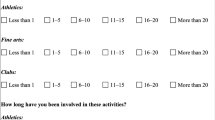Abstract
In questionnaire and achievement-test data from 1584 seventh- and ninth-grade students, relationships between academic achievement and amounts of time devoted to various uses related to school, family, peers, and the mass media are examined, with relevant demographic factors controlled. Multiple regression analyses support hypotheses of (a) a negative relationship among ninth graders between achievement and time spent listening to radio and records, (c) an interaction between parental occupation and time spent watching television, with trends toward positive association between achievement and TV time when occupational status is low and negative association when it is high, and (d) a positive relationship between reading and overall achievement and time spent on leisure reading. Hypotheses of positive relationships between achievement and time spent on homework in this age range and mere time spent with the parent receive no support. The relationship between achievement and time spent on household chores is explored without a hypothesis, and the relationship is found to be negative. The findings are discussed in terms of the impact of the adolescent subculture and in terms of the family, school, peer group, and mass media as agencies of socialization relevant to academic achievement.
Similar content being viewed by others
References
Bloom, B. S. (1984). The search for methods of group instruction as effective as one-to-one tutoring.Educ. Leader. 41(8): 4–17.
Coleman, J. S. (1961).The Adolescent Society, Free Press, Glencoe, IL.
CTB/McGraw-Hill (1982).Comprehensive Tests of Basic Skills U and V Preliminary Technical Report, CTB/McGraw-Hill, Monterey, California.
Epstein, J. L. (1984). Effects of teacher practices of parent involvement for change in student achievement in reading and math. Paper presented at the annual meeting of the American Educational Research Association, New Orleans.
Foyle, H. C. (1984). The effects of preparation and practice homework on student achievement in tenth-grade American history (doctoral dissertation, Kansas State University).Dissert. Abstr. Int. 45: 2474A-2475A.
Hollingshead, A. B. (1957).Two Factor Index of Social Position, August B. Hollingshead, New Haven, CT.
Hornik, R. (1981). Out-of-school television and schooling: Hypotheses and methods.Rev. Educ. Res. 51: 193–214.
Karweit, N. L. (1981). Time in school. In Kerckhoff, A. C., and Corwin, R. C. (eds.),Research in Sociology of Education and Socialization, Vol. 2, JAI Press, Greenwich, CT.
Keith, T. Z., and Page, E. B. (1985). Homework works at school: National evidence for policy changes.School Psychol. Review 14: 351–359.
Keith, T. Z., Reimers, T. M., Fehrmann, P. G., Pottebaum, S. M., and Aubey, L. W. (1986). Parental involvement, homework, and TV time: Direct and indirect effects on high school achievement.J. Educ. Psychol. 78: 373–380.
Larson, R. W. (1983). Adolescents' daily experience with family and friends: Contrasting opportunity systems.J. Marriage Family 45: 739–750.
Marjoribanks, K. (1983). The evaluation of a family learning model.Stud. Educ. Eval. 9: 343–357.
Maruyama, M. (1963). The second cybernetics: Deviation amplifying mutual causal processes.Am. Sci. 51: 164–179.
Mead, G. H. (1934).Mind, Self, and Society, University of Chicago Press, Chicago.
Montemayor, R. (1982). The relationship between parent-adolescent conflict and the amount of time adolescents spend alone and with parents and peers.Child Dev. 53: 1512–1519.
Morgan, M., and Gross, L. (1981). Television and educational achievement and aspirations. InTelevision and Behavior: Ten Years of Scientific Progress and Implications for the '80's, National Institutes of Mental Health, Washington, DC.
Paschall, R. A., Weinstein, T., and Walberg, H. J. (1984). The effects of homework on learning: A quantitative synthesis.J. Educ. Res. 78: 97–104.
Piaget, J. (1965).The Moral Judgement of the Child, Free Press, New York.
Seginer, R. (1983). Parents' educational expectations and children's academic achievements: A literature review.Merrill Palmer Q. 29: 1–23.
SPSS (1986).SPSS x User's Guide, SPSS, Inc.
Stanley, J., and Hopkins, K. (1972).Educational and Psychological Measurement and Evaluation, Prentice-Hall, Englewood Cliffs, NJ.
Walberg, H. J. (1984). Improving the productivity of America's schools.Educ. Leader. 41(8): 19–30.
Williams, P., Haertel, E., Haertel, G., and Walberg, H. (1982). The impact of leisure time television on school learning.Am. Educ. Res. J. 19: 19–50.
Youniss, J. (1980).Parents and Peers in Social Development, University of Chicago Press, Chicago.
Author information
Authors and Affiliations
Additional information
Professor Smith has a Ph.D. in sociology and a history of research on parental influence and parent-adolescent relations. Currently, he is conducting research on the antecedents of academic achievement.
Rights and permissions
About this article
Cite this article
Smith, T.E. Time and academic achievement. J Youth Adolescence 19, 539–558 (1990). https://doi.org/10.1007/BF01537175
Received:
Accepted:
Issue Date:
DOI: https://doi.org/10.1007/BF01537175




